ENGLISH ENGLISH 2024

ENGLISH FACULTY EMBRACE
VOLUNTEER ACTIVITY
Volunteerism is an important aspect of faculty service, and many in the English department volunteer within the department and the community. Addressing social, political, and health issues, the department’s commitment to volunteer activities is robust.
Sybil Baker: I volunteer along with other CAS faculty and staff. I help serve food at the Community Kitchen. I started last spring. I enjoy representing UTC as a volunteer in the community. Others in CAS who are

interested can also volunteer—it’s just once or twice a month. Contact McKenzi Marlowe to ask to be put on the volunteer list.
Heather Palmer: I volunteer at Opie Acres, an opossum rescue organization. I clean cages and help feed the opossums a special diet. They are often misjudged but have an important role in our ecosystem. They look a little scary but aren’t vicious and pose no threat to humans.
(continued on page 17)
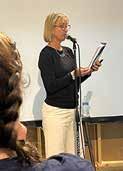
Justin Wymer Joins English
Dept. see page 5
Sybil Baker Leads Meacham see page 31
ENGLISH DEPARTMENT
ADMINISTRATION
2023–2024
Head, Department of English
Senior Associate Department Head
Associate Department Head
Director of English Graduate Studies
Director of Composition
Director of General Education
Director of Women, Gender, & Sexuality Studies
English Internships Coordinator
Classroom Technologies & Website Coordinator
Administrative Assistant, Composition Program
Executive Secretary
Dr. Andrew McCarthy
Dr. Bryan Hampton
Prof. Sybil Baker
Dr. Rik Hunter
Dr. Jenn Stewart
Dr. Lauren Ingraham
Dr. Marcia Noe
Kristine Whorton
Tiffany Mitchell
Yvonne Artis
Heather Grothe
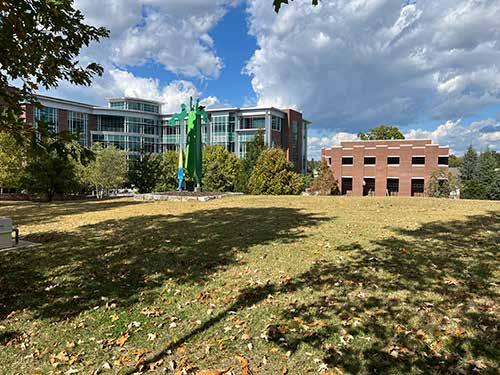
2
3 CONTENTS English Faculty Embrace Volunteer Activity 1 Letter from the Head, Andrew McCarthy 4 Justin Wymer Joins the English Department 5 Alumni Reading Held at ArtsBuild 6 Najberg’s New Horror Novel 7 Bedbugs and English: A Rhetorical Spin 8 Babine Leads Craft Paper Boot Camp 9 Braggs Releases Moving to Neptune 10 Alumnus Tiffany Herron Explores Her Samoan Heritage 10 Undergraduate Spotlight: Jane Dodge 12 Leaves of Grass in the Morning Sunlight 13 A Ghost Story from Sybil Baker 14 English Club Explores Career Paths 15 Balazs Publishes New Horror Story 16 Jessica Miller Wins Book Award 20 Noe Serves with the League of Women Voters 21 Pool and Mullins Engage Offenders through Creative Writing 22 Hartline Volunteers with Girls and Gardening 24 McCarthy Serves as YSSW Chair 25 Undergraduate Spotlight: Luis Alejandro 26 Undergraduate Spotlight: Maggie Turbyfield 27 Undergraduate Spotlight: Madison Poke 28 Valentine’s Day English Style 30 Meacham Writers’ Workshop Continues with New Director 31 Graduate Student Spotlight: Emily Turner 32 Meacham Writers’ Workshop Hosts Spring events 34 Kennedy Lecture Examines Due Process in Hamlet 36 Take 5 Takes on Education 37 Join Us on UTC English Department Social Media 38 Awards Banquet Fills the Guerry Center 39 Department Head’s Annual Faculty Awards 40 Sequoyah Review Launches New Issue 41 Graduate Student Spotlight: Brooke Pierson 42 Graduate Student Spotlight: Julia Kicinski 44

LETTER FROM THE HEAD, ANDREW MCCARTHY
Welcome once again to the UTC English Department’s annual alumni newsletter! This is our fourth issue and I’m thrilled to share the impressive work of our alumni, faculty, and students in addition to profiles of folks who make our department such a special place to learn and work.
Service has always been an important component of the English Department at UTC. But in the pages that follow, you’ll see how my colleagues serve beyond the department, college, and University. From work at the Community Kitchen to volunteering at an opossum rescue to coaching at the YMCA, this newsletter highlights some of the many ways English faculty help out in our larger Chattanooga communities. You’ll learn about Dr. Megan Hartline’s work with City Farms and Tracye Pool’s creative writing initiative with the Day Reporting Center for the Tennessee Department of Corrections.
Three of our creative writers— Andrew Najberg, Professor Sybil Baker, and Dr. Tom Balazs—published works that engage ghosts and horror, Dr. Justin Wymer joined the faculty as our newest poet, and
Professor Earl Braggs published a jazz-inflected collection of poetry. Our Rhetoric and Professional Writing and Literary Studies faculty put together a variety of engaging programming, including guest lectures on subjects as diverse as bed bugs and Hamlet, and the ever-popular Take 5 considered higher education. We celebrated our many accomplishments at the end of April with a packed awards ceremony featuring a new format, a new location and, some may say, too many Taylor Swift references.
I hope you enjoy perusing these digital pages and seeing for yourself some of the reasons why we were named the 2023 College of Arts and Sciences Department of the Year.
Thanks, again, to Russell Helms, the newsletter’s managing editor for producing yet another thorough account of the English Department’s many activities from the 2023–24 academic year. While we can’t possibly capture everything that happens in a vibrant and dynamic department like ours, we do hope this year’s edition gives you a sense of what we’re up to. And if you’re working on something you’d like to see showcased here, please don’t hesitate to get in touch!
Sincerely yours, Andrew
4
JUSTIN WYMER JOINS THE ENGLISH DEPARTMENT
The English Department welcomed its newest faculty member this fall, Dr. Justin Wymer, who teaches poetry. His teaching/research interests are all things poetry and poetry writing, but also critical writing, hybrid-genre works, poetry of excess, nature poetry, and literary trauma studies.
Wymer is originally from Saint Albans, West Virginia. He has spent the last fifteen years living in several places in Spain and the United States, most recently Denver. Prior to UTC, he taught at the University of Iowa, the University of Denver, the Jack Kerouac School of Disembodied Poetics’ MFA program at Naropa University, a high school and adult language center in Spain, and high-school students in West Virginia. He has also taught students online in Afghanistan, China, Canada, and the United States through the Hudson Valley Writers Center, SandwiChina, and the Iowa International Writing Program. His first poetry collection is entitled DEED (Elixir, 2019).

Regarding Chattanooga, Wymer says, “I feel a deep connection to the landscape here, having grown up in a place that looks similar. Right now, it’s thunder-storming, and the trees outside my apartment balcony flail in green tumult. I’m reminded, in such lushness, that the earth is alive and fighting for its place in our attention. The food and produce I’ve had have been delicious, and folks have been friendly. I’m excited to be here and am looking forward to meeting more colleagues.”
5
Justin Wymer
ALUMNI READING HELD AT ARTSBUILD
Five writers whose passion for creative writing blossomed during their undergraduate days at the University of Tennessee at Chattanooga were featured in a Meacham Writers’ Workshop event. The alumni reading took place on October 21 at ArtsBuild in Chattanooga.
The program, which was free and open to the public, was co-sponsored by SoLit (previously known as Southern Lit Alliance).
The five UTC alumni participating in the event were:
• George Conley Jr. (1984 and 2010), a poet whose poems have appeared in the Sequoya Review and Black Magnolias Literary Journal.
• Rebecca Cook (1998 and 2001), writer of the novel Click and two books of poetry, I Will Not Give Over and The Terrible Baby.
• Rachel Crumble (1980), author of the Sister Sorrow poetry collection and a finalist for Writer’s Relief’s Peter K. Hixson Memorial Award.
• Jude Keef (2023), a writer of lyric essays and a May 2023 UTC graduate. His creative nonfiction essay, “Fragments,” won first place in the 2023 Southern Literary Festival Undergraduate Writing Contest.
• Gwen Mullins (1996), whose story, “Violent Devotion,” was selected by series editor Otto Penzler and guest editor Sara Paretsky for inclusion in “The Best Mystery Stories of the Year 2022.”
Said Sybil Baker, the Meacham Writers’ Director, “We’re looking forward to hearing creative work from some of our talented UTC alumni and hope to have more of these events in the future.”

6
Jude Keef
NAJBERG’S NEW HORROR NOVEL
The Neverborn Thief (Olive-Ridley Press, January 2024) tells the story of Connor Brighton, a boy whose mother is struggling to support the household because his father recently died in a car accident. He finds himself forced to journey into the Shadowlands to recover his stolen shadow. Once there, he faces a harrowing world of monsters and menace where betrayal is its own currency, and he can’t trust anyone or anything. He manages to join forces with a little girl nicknamed Mouse, who is pursuing her own stolen shadow, and together they must learn how to navigate a world far more dangerous than anyone their age should face, while also coming to realize that the darkest parts of a shadow world might be the things they brought with them.

Najberg had this to say about the novel in terms of why it is important to him: “As an author who writes both poetry and horror novels, one thing I’ve always found a little frustrating is that there is a huge part of my creative life that I can’t really share with my kids. Because this novel— while it certainly has dark elements—is written towards a younger readership, I can’t express how much it means to me that my kids will be able to enjoy this book while they’re still kids. That said—the story itself is also one that has its own meaning to me as well. In many ways, I used the writing and construction of the story to revisit and consider some old emotions about things that happened in my household when I was the protagonist’s age. I will say, the exact plot is entirely fictional, but the emotions underlying them are things I very much grappled with during that time in my life.”
7
Andrew Najberg
BEDBUGS AND ENGLISH: A RHETORICAL SPIN
On September 28, 2023, Donnie Johnson Sackey discussed his research on “Getting Bed Bugs: Spatializing Invasions Rhetorical Ecology.” This event was sponsored by the English Department along with the Environmental Science minor. Dr. Sackey is a graduate of the University of Tennessee at Chattanooga. He has a book coming out soon called “Trespassing Natures.” Sackey has won numerous awards, including the Alumni Award from UTC.
During his talk in the Roth Reading Room, Sackey noted that there is great bias towards minorities and low-income families when it comes to bed bugs; those people become ashamed because they’d rather deal with the issue on their own and shy away from seeking professional help. Sackey related a story of when he once had bed bugs himself but received no help from his landlord.
Bed bugs carry stigma, leading many to ignore the problem, which causes bedbugs to spread. There is the preconceived notion that bed bugs are caused by dirty homes, but this is not always the case. The preconceived notion that bed bugs were brought from foreigners led to discriminatory behavior toward them. There were several early manuals written on how to get rid of bed bugs, including A Treatise of Buggs by John Southall. The Complete Vermin Killer used comedic ways of trying to get rid of the pests, one involving gun powder and another using boiled urine or rabbit guts.
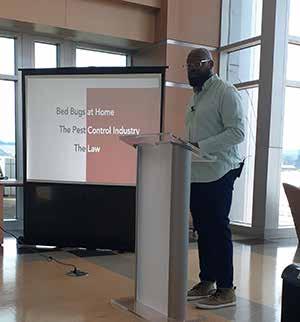 Dr. Donnie Sackey
Dr. Donnie Sackey
The issue of bed bugs became entwined with domestic work. Women were expected to look after the home, make sure it was clean, and monitor the problem, making bedbugs a private rather than a public concern, where people had to deal with the problem themselves. Cyanide gas became a
8
solution but proved deadly and inconvenient. As more and more women took up careers, do-it-yourself methods became ingrained, which caused even more bed bugs. Ultimately, lower-income homes bore the brunt of bedbugs, making the pests a condition of the poor, which is still true today.
BABINE LEADS CRAFT PAPER BOOT CAMP
Students needing to write a craft paper for a creative writing class or thesis project were invited by Dr. Karen Babine to attend a craft paper boot camp. Says Babine, “Do you need to write a craft paper? Are you not sure where to start—or why you’re being asked to write one at all? We’ve got you covered!”
Three sessions comprised the boot camp: What is a Craft Paper?; Research and Structure: How To; and I’ve Got a Draft—Now What? The event ended with a workshop of craft papers created. The meetings were designed to be supportive, collaborative, and practical, and were held in Lupton Hall.
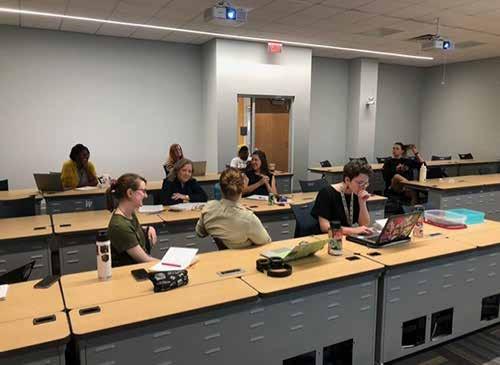
9
BRAGGS RELEASES MOVING TO NEPTUNE

Earl Braggs latest book of poetry, Moving to Neptune, is from Anhinga Press (2023).
Reviewer George Drew says, “Jazz runs through Moving to Neptune like fishing line through lily pad. You can’t always see it, but it’s there, dangling its smoky lure, enticing a reader’s ear. You can feel it, sense it, your whole body vibrant and attuned to its riffs and runs. That’s the kind of poet Braggs is, a risk taker in his language use, but always driven by a sense of play and purpose, stretching out the sound and sense like a jazz man.”
ALUMNUS TIFFANY HERRON EXPLORES HER SAMOAN HERITAGE
Tiffany Herron is an alumnus from the University of Tennessee at Chattanooga with a master’s degree in creative writing. She writes creative nonfiction and works as an assistant producer at Civil Productions, which is where she created her short film called, How to Sue the Klan. The English Club event, where she spoke, took place in October 2023.
Herron’s work is grounded in her Samoan heritage and background. She was adopted and moved from state to state, missing the chance to immerse herself in Samoan culture. While at UTC, she explored her Samoan background, finding her biological family and details about her adoption. She then found her siblings on Facebook, learning about her past and culture
10
and studying the Samoan language.
Her thesis, “Nafanua and the Afakasi Sister,” relies on Samoan mythology and is a memoir. The thesis reflects her personal research and explores her younger self’s world view. After visiting Samoa, she relied on that experience to end her thesis. Tiffany received a grant from Arts Build, which supports local artists, to support her journey to Samoa.
Despite being Samoan, she felt vulnerable, but stepping into the ocean water of her native country made her feel like she could absorb everything. Herron says that fieldwork is very important to the writing process. Herron wonders how her life would have been different had she been raised in Samoa and notes that she has often felt that she does not “fit in.”

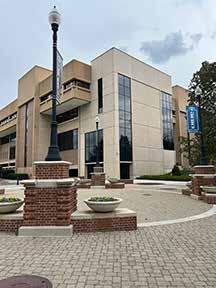
Herron read from her work about Nafanua, who is the Samoan goddess of war. She has imagined her own interpretation of the legend to tell her own story. “Afakasi” describes someone who is half Samoan and half European, which she is. As in the story of Nafanua, Herron continues to wrestle with her cultural identity but has gained valuable insight through her academic pursuits.
The event was co-sponsored by the Creative Writing Club, the English Club, and the MA Program.
11
Rik Hunter with Tiffany Herron
UNDERGRADUATE SPOTLIGHT: JANE DODGE
Jane Dodge is from Memphis. She loves getting out and seeing new places and travel is her main interest. Says Dodge, “Like every other English major, I do love to read. In my free time and for school, I enjoy learning Latin and Italian.”
Dodge is pursuing a degree in literary studies, minoring in communication and classics. She chose English as her major as a result of a combination of being bored to death in the classes of her original major and much encouragement from her professors. “I love rhetoric and literary studies equally.” A Brock Scholar within the Honors College, Dodge is the managing editor for UReCA, the NCHC Journal of Undergraduate Research and Creative Activity.
If a student is questioning English as a degree, she says, “Do it anyway. Are you worried about becoming an English major but you don’t know what your family will think? Do it anyway.”
 Jane Dodge
Jane Dodge
Upon graduation, Dodge will take some time off before applying to graduate school “so I have a better idea of my life after a very important (and expensive) degree. In that time, I’m hoping to teach English abroad or ESL.”
Regarding research and reading, she is “entirely fascinated by the mid-twentieth century.” She is currently writing her honors thesis on food, eating, and the woman’s role in Sylvia Plath’s writing. “However, I love the Beats and could easily spend my whole life trying to understand the complexities and synchronicities in their collective works.”
12
LEAVES OF GRASS IN THE MORNING SUNLIGHT
In homage to Walt Whitman’s abandoning regular meter and rhyme in Leaves of Grass, Spring Kurtz’s Introduction to Literature students abandoned their usual study in the classroom to take a closer look at “Song of Myself” outside, in the morning sunlight and the tree-lined spaces on UTC’s campus. Their aim was to “get at the meaning of poems.” To do so, the class talked about the literal interpretations of Whitman’s lines, like answering the poet’s invitation to “lean and loaf at ease observing a spear of summer grass.” Kurtz’s class covered other ways to read Whitman’s lines. They identified examples of figurative language and asked themselves how pausing to think and feel their way through allusions, symbols, and metaphors might help them better understand Whitman’s song—and even themselves. The class wondered at the richness of language, at the richness of human experience.

13
A GHOST STORY FROM SYBIL BAKER
Sybil Baker’s latest novel is Apparitions from Signal Press (2023). Baker read from her work at Stove Works on September 14 to a crowd of fifty-plus. Opening the event, Chattanooga poet Christopher Collier read from his current and recent works. Here is a synopsis of the book:

“After Simone learns that her ex-husband Guy has died unexpectedly at the age of fifty, her only regret is that she didn’t expose his affairs when she had the chance. But when a woman asks her to help her disrupt his Celebration of Life planned in Northern Cyprus, Simone wonders if she has a last chance to reveal Guy’s hypocrisy. Accompanied by her best friend, Simone arrives in Cyprus; however, the circumstances surrounding Guy’s death become increasingly mysterious. Worse, since Guy’s death, Simone has been haunted by Guy and the ghosts of her loved ones warning her of impending danger. As the Celebration approaches and Simone’s mental state deteriorates, she must decide who she should trust and who she must betray in order to save herself.”
Baker noted at the reading that she had fallen in love with Northern Cyprus, having traveled extensively there, and she includes authentic detail in the novel from her travels within the unrecognized country (only recognized by Turkey).
14
ENGLISH CLUB EXPLORES CAREER PATHS
The English Club, led by Joseph Jordan, hosted a series of talks with former English majors about their career paths. Says Jordan, “We’ve all had the dreaded ‘ummm, so what will you do with an English degree?’” conversation with friends and family, and sometimes it can feel like the options are limited!” The club brought in a range of professionals who have used their English degrees to pursue careers outside of some of the more obvious career paths (like teacher, lawyer, or creative writer).
The first conversation in Lupton Hall hosted Francesca DiCillo. After teaching English in South Korea for two years, she moved to NewYork City to work at Paramount. She is currently the senior manager of pricing and planning and is a great resource for thinking about the huge number of possible career paths for English majors.
A second event hosted guest speaker Abby Kim, a grant writer at Independence Center, a nonprofit providing services for people with mental illness. Kim has over a decade of experience working in nonprofits writing grants, marketing, donor relations, and community engagement. Kim discussed her career path and how the English major opened doors for her.
The English Career Conversations continued into spring semester. The first conversation took place February 22. Students and faculty welcomed Ms. Morgan Mack, a copywriter at DDB NY who has worked on campaigns for a wide range of well-known brands, including: Fenty Beauty, Lysol, Verizon, Mastercard, Neutrogena, and more.
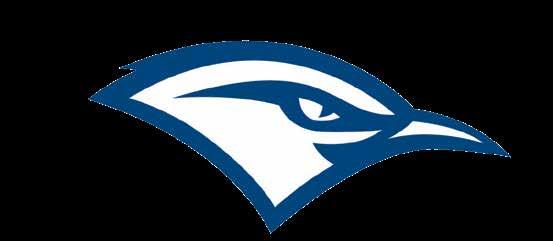
15
BALAZS PUBLISHES NEW HORROR STORY
Dr. Thomas Balazs’ story “The Yearning Pool” appeared in Horror Library, Volume 8, from Dark Moon Books. The story arose from two prompts, one a conversation he had with a colleague and the other a literal prompt he gave his students in class. Says Balazs, “At Rick Jackson’s retirement party, I was telling Greg O’Dea about my high-school experiences “pool hopping,” and he said I should write it up as a short story. A short time later, I gave this as a prompt to my students: ‘Write a horror story set in a swimming pool.’” Balazs responded to the prompt himself with a variation on the story he told O’Dea. “What is it about?” he asks. “Yearning. In the 1970s.”

As a part of his sabbatical project, Balazs created a Substack that anyone can follow. He said, “My Substack started out as a “sandbox,” a place to play with ideas for a series of personal essays I’m working on during my sabbatical, in which I document some of my explorations in Orthodox Judaism. It’s gradually becoming a thing of its own. In it, I reflect on the sort of monkey-mind questions that trouble me on my religious quest, stuff like why my faith doesn’t permit me to play the ukulele on the Sabbath or whether we are all just biological versions of AI devoid of free will—and suffering under the illusion of sentience. You know, the kind of stuff you think about when you’re walking the dog in the forest. . .if you’re me.”
16
Thomas Balazs
ENGLISH FACULTY EMBRACE VOLUNTEER ACTIVITY
(from page 1)
In fact, they are beneficial scavengers of our leftovers and eat ticks.

Matthew Evans: I volunteer with other faculty and staff members, serving lunch to the folks who rely on the Chattanooga Foundation (Community Kitchen) for support. I am thankful for the opportunity to work with my colleagues to provide such a tangibly beneficial service to homeless people in Chattanooga.
Alex Quinlan: I volunteer as a youth basketball and soccer coach at the North River YMCA. This is important to me because it allows me to share my love of the game with my kids and their teammates. The unintended benefit has been that a lot of what I’ve learned about coaching six-year-olds works just as well in the college classroom.
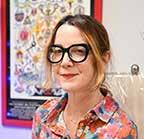

Christopher Stuart: I began driving for Meals on Wheels because I was going through a difficult time in my life, and my mom’s advice on such things has always been “volunteer for something and take your mind off yourself.” So, I did, and I have now been driving on Monday mornings for three years. It’s not much, just once a week for about an hour and a
17
Sybil Baker
Heather Palmer
Matthew Evans
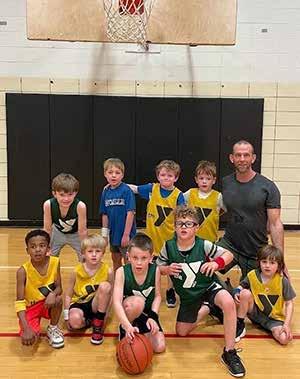
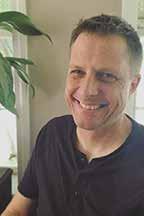
half. What’s important to me is the relationships. You would not think that a five-minute interaction at a doorstep would count as a relationship, and in some cases, it really doesn’t, but in others it does. There are a handful who know me and who have told me that I and the other drivers are “their angels,” “a lifeline,” etc. We are sometimes, I think, the only people they see all day. They are all low income, and some have no families in their lives. I visited one in the hospital when he thought he was dying (and I thought he was, too). I will always be glad that I have met these people, and as in teaching, I have hope that I may be doing some good that reaches beyond the few minutes we spend together.
Jean Paul Vaudreuil: I volunteer at two local races: Ironman Chattanooga 70.3 in May and the full Ironman Chattanooga in September. I usually volunteer at a run aid station but have been a volunteer captain in previous years. As a triathlete myself, I feel it’s important to support these races. Indeed, they could not be held if it wasn’t for enormous volunteer support. Additionally, I gave my fall semester students extra credit if they volunteered and wrote about their experience. Nearly every student says they had fun and would do it again, even without the extra incentive. Many find it inspirational to witness the physical challenges in finishing the race. I also volunteered last
18
Alex Quinlan and YMCA kids
Christopher Stuart
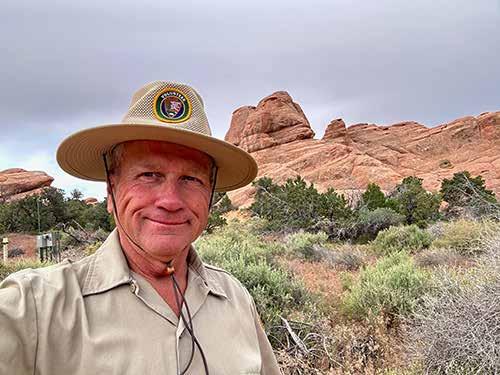
June and will do so again this June as a monthlong campground host for Arches National Park in Utah.
Earl Braggs: Braggs volunteers with four groups: (1) Rhyme N Chatt—helps with programming/ poetry reading; (2) ACT SO program-teacher and mentor; (3) Lit Alliance—whatever they need for me to do and poetry reading; (4) UTC Gear Up Program—speaker and writing judge
Andrew Najberg: I’ve just started working with SoLit. I also did a middle school visit with Be The Change. I think that producing artists have a unique opportunity to work towards enriching the community because our tangible output creates excitement and can encourage people, especially young folks, to take an active interest in the arts.
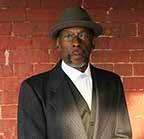
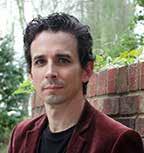
19
Jean Paul Vaudreuil in Arches National Park
Earl Braggs
Andrew Najberg
Tiffany Mitchell: I volunteer at Chattanooga Preparatory School as an ELA Tutor because I believe in the school’s motto of “building the men of tomorrow.” I’ve volunteered my skills, time, and talent in my children’s schools since they were young. As they transition to middle school and beyond, I’m continuing that because K–12 education should be about partnership between the school staff and the parents.
Russell Helms: I just started volunteering with the Community Kitchen. It’s great to serve others, even if it means just scooping a ladle of corn onto a plate.
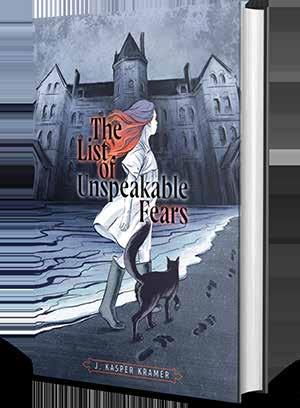

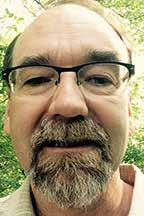
JESSICA MILLER WINS BOOK AWARD
The List of Unspeakable Fears, the second middle-grade historical fiction novel by adjunct instructor and former graduate student Jessica Miller (pen name J. Kasper Kramer), is the winner of the 2024 Georgia Children’s Book Award for grades 4–8. Jessica’s next novel, Eyes on the Sky, comes out October 8. The List of Unspeakable Fears is available in hardback, paperback, ebook, and audiobook from Simon & Schuster/Atheneum.
20
Tiffany Mitchell
Russell Helms
NOE SERVES WITH THE LEAGUE OF WOMEN VOTERS
Dr. Marcia Noe is in the first year of a twoyear term as First-Vice President of the League of Women Voters of Chattanooga. Prior to that, she served as Second Vice-President. She has worked with the Board of the League of Women Voters of Chattanooga since 2017. Her first Board responsibility was membership, and her current Board responsibility is programming. Here is the mission statement of the League of Women Voters:

“The League of Women Voters, a nonpartisan political organization, encourages informed and active participation in government, works to increase understanding of major public policy issues, and influences public policy through education and advocacy.”
Along with Noe’s board responsibilities, she has helped to register voters at community sites and has helped conduct elections for the Chattanooga Housing Authority. Each year for the past five years, UTC’s Women, Gender, and Sexuality Studies Program has partnered with the League to hold a campus-wide voter registration drive. Says Noe, “In my capacity as Director of Women, Gender, and Sexuality Studies, I have spearheaded this effort. WGSS has also partnered with the League in sponsoring on-campus programs on voter turnout and youth participation.”
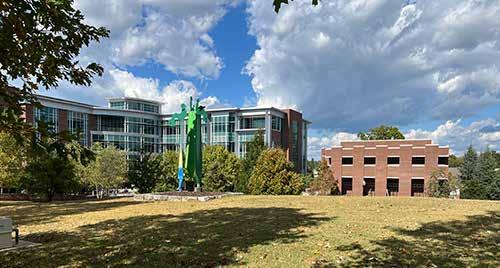
21
POOL AND MULLINS ENGAGE OFFENDERS THROUGH CREATIVE WRITING
Gwen Mullins and Tracye Pool have been teaching creative writing at the Day Reporting Center (DRC) for the Tennessee Department of Corrections since August 2023, holding a weekly class at a facility in the Uptain Building.
As part of the Public Safety Act of 2016, the Tennessee Department of Correction (TDOC) implemented Day Reporting/ Community Resource Centers, which serve as alternatives to incarceration by placing eligible participants in structured and intensive outpatient programs. The programs provide resources and services to offenders to assist them as they work towards becoming productive citizens in their communities.
The DRC offers a one-year, three-phase program that assists offenders with moderate to high substance use needs. To be eligible for the program, the participant must be under the supervision of TDOC’s Community Supervision and have at least eighteen months left on probation or parole supervision. It is more cost-effective to keep non-violent offenders out of the prison system. It currently costs $79 per day to incarcerate an offender versus $41 per day for an offender to report to a Day Reporting/Community Resource Center. Says Mullins, “Our goal is to provide the participants with evidenced-based programming and treatment in an environment where they can continue to be with their families and community.”
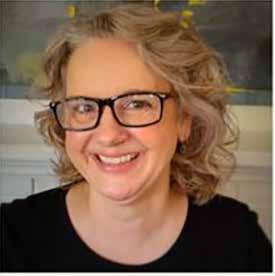 Gwen Mullins
Gwen Mullins
Says Pool, “It has been somewhat challenging earning students’ trust, but I think that has changed/is changing. Perhaps it’s because we are volun-
22
teers, but I think students understand that we are there because we want to be there and that we are not part of “the system.” I always feel that sharing one’s writing with someone else—especially people you don’t know well—is an act of radical trust, and I’ve been impressed by participants’ willingness to share their stories.” Pool notes that many participants are natural storytellers and are generous with their gifts. Also, she has been inspired by the relationship between participants. “They are genuinely interested in one another, respectful and appreciative when others share their work, supportive, and clearly hold one another accountable.”
 Tracye Pool
Tracye Pool
Says Mullins, “The rewarding parts include participants who engage with the concepts we present and generate work based on their own experiences. Tracye and I are working to put together a compilation of writing from this program, though we will likely need at least one more course before we gather enough material for a small journal.”
Mullins is also working with the Northside Neighborhood House (NNH) through SoLit’s youth outreach program to develop and lead an eight-week creative writing class for high school students in the NNH after-school program at Hixson High School.

23
HARTLINE VOLUNTEERS WITH GIRLS AND GARDENING
Dr. Megan Hartline volunteers with two organizations: Girls Inc. and the City Farms Growers Coalition. She works with the Evaluation and Assessment Team for Girls Inc. Chattanooga, using her expertise in qualitative research and storytelling to help design assessment materials for Girls Inc. programming. She involves students in two class projects: 1) an interview study analyzing literacy attitudes in elementary school girls and 2) the design of professional development materials for program leaders to learn best practices for storytelling in fundraising.
Hartline also is the Communications Consultant and a Garden Volunteer at City Farms Growers Coalition. She has worked with City Farms for three years, primarily through a few community-engaged classes like Community Writing and Writing for Social Change. They spend time volunteering in the gardens across the city and then create pieces of writing—videos, brochures, post cards, social media posts, and more—to tell the stories of urban food justice work in Chattanooga. Through their combined 600 hours of gardening and writing work over the last three years, they have increased capacity for this small organization to do the work of providing access to healthy, locally grown produce to people with limited access.

24
MCCARTHY SERVES AS YSSW CHAIR

Dr. Andrew McCarthy presiding over the YSSW ceremony (credit: Chelsea Risley)
This year’s Young Southern Student Writers contest was a huge success. There were 1,000 more entries than last year and nearly 300 young writers were recognized with awards. With the help of SoLit, the contest’s co-sponsors, two ceremonies were held at the Roland Hayes Concert Hall at the end of April and both were packed, leaving standing room only. The contest’s growth speaks both to the outstanding work of Hamilton County’s teachers and students, but also the value our community continues to place on literacy. Says McCarthy, “We’re thrilled to play a role in celebrating the literary arts in the larger Chattanooga community.”

25
UNDERGRADUATE SPOTLIGHT: LUIS ALEJANDRO
Undergraduate student Luis Alejandro says, “I’m a very simple guy when it comes to my interests and hobbies. I read and write, but I also like to hang out with my friends.” He likes to enjoy new places and do new things. When lonely, he embraces his dreamier side. “I love to think of impossible things, or I think of various paths I could take in my life. I like to dwell on the good and the bad, no restraints.”

Alejandro is pursuing a degree in creative writing with a minor in communication. He switched majors from communication to creative writing after taking a creative writing class with Russell Helms. He chose this new degree because of a desire to study authors of creative writing. “I want to analyze, dissect, and learn from different styles of writing. To an undergrad interested in pursuing an English degree, he would tell them to enjoy the readings. He says, “There’s so much you can get out of an author if only you dedicate time and patience.”
Alejandro wants to be a writer. He says that he has many dreams, “and each one of them weighs on me. I plan to achieve them all.”
He enjoys reading fantasy and romance. He is also really interested in literary fiction. “I’m finding myself reading more out of that genre, like V. E. Schwab’s The Invisible Life of Addie LaRue, and I have plans to write something within the genre.”
26
Luis Alejandro
UNDERGRADUATE SPOTLIGHT: MAGGIE TURBYFIELD
Maggie Turbyfield is the oldest of three kids. “According to most people I look like my mom. My dad and I have the same sense of humor. For hobbies, I knit, occasionally crochet a crooked granny square, embroider, write (because I’m an English major, right?), and love to read.” She likes to spend time at used bookstores like McKay’s and 2nd and Charles. She is pursuing an undergraduate English degree in literary studies with a minor in education. Turbyfield is a Brock Scholar with the UTC Honors College and is the editor-in-chief of UReCA, the NCHC Journal of Undergraduate Research and Creative Activity.
She almost decided to be a history major because of a fantastic history teacher throughout high school. She finally decided on English when she realized her favorite part of history classes was when the class read novels and analyzed them in a historical context.
“I have always loved books; I even learned to read upside down so I could see what my mom was reading across the table from me. I have been surrounded by books my entire life; it was only a matter of time until the books caught up with me and made me an English major.”

Her advice for students trying to decide whether or not to be an English major is that it is an adaptable degree. She says, “You can be a teacher, author, law student, communications worker, and many other career fields.” Her advice for English majors is to be fearless and to take risks and speak up in classes. “Also, when you do not get the grade you wanted on a paper, go ask the professor what you can do to improve for the next paper. Ask if
27
Maggie Turbyfield
they have any methods, techniques, or feedback for your next paper.”
After graduation, Turbyfield plans on being a high-school English teacher. She is also interested in policy writing, administration, and curriculum writing. She plans on getting her masters degree in education as soon as possible. In regard to reading, she is currently interested in studying young adult fiction, especially coming-of-age stories.
UNDERGRADUATE SPOTLIGHT: MADISON POKE
Madison Poke and her family are from Chattanooga. Her mom was the first in her family to graduate college, earning her degree at UTC. Earlier this year, Poke picked up a new hobby—rock climbing. Poke says, “The sport is so different than any physical activity I have participated in.” She played “more than my fair share” of sports growing up. She was a gymnast for many years, and played softball and soccer in middle and high school. Says Poke, “There is something uniquely stimulating about working against gravity to move your body in a way that is completely new to you. Other than school, climbing is the most difficult activity I have ever participated in by choice.”
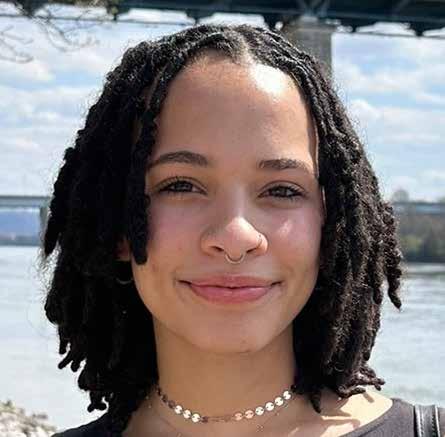
Poke is pursuing a literature degree. Initially, she majored in secondary education: English. She switched to literature because Dr. Joseph Jordan of the English Department persuaded her to. He said she would learn more about English if she did. “I have been grateful for his advice ever since.”
She has this advice for undergraduate English majors: “You have to do your reading! In other classes where you don’t have to read, it is occasionally possible to be successful by doing things last minute and skimming your work. In most English courses, that is not possible. If you try to go without doing your assigned reading, it will end up being a lot more stress
28
Madison Poke
and effort than just doing the reading.” After graduating, Poke plans to earn a master’s degree in library science with a goal of working in literary curation and archives.
In regard to reading, she is “most fascinated by minority works with existential themes. When it is a minority author that creates a journey of a character’s experience through realizing that they are a free agent, the novel is more relatable and realistic to me. Through those readings, I am always astounded by how the writers incorporate the unsettling experience of being a minority grappling with the truth of your own character in a space where you do not fit the blue print, even that of your own race. My favorite minority-written existential novel is The Vegetarian by Han Kang.”

At times, Poke has not been sure that English is the right major but ultimately she has been able “to find my passion.” She says, “Your major can be more than you think if you keep your mind open.”

29
VALENTINE’S DAY ENGLISH STYLE
On Valentine’s Day, English students attended the annual Roses and Whine event hosted by Lauren Cain. Students read poems in the categories of love, antilove, lust, and “out of the box.” The event began with short readings by Sybil Baker and Russell Helms, both reading Neruda poems. On the fiddle and banjo, Matthew Evans provided the music. Awards were given to students in each of the categories, although no one read an antilove poem.
The winners were: Love: Laurie Sage; Lust: Elyssa Looney; and Out of the box, Joe Brooks. Poems explored love in its many colors, including longing, commitment, and beauty. One poet asked: “Do birds with broken necks still sing?”
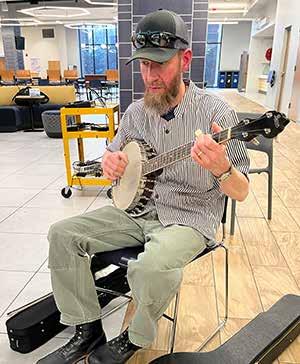
Forty students attended the event, which was organized by the Creative Writing Club. In attendance was Catherine Meeks Quinlan, co-leader of the club. Department head Andrew McCarthy started the event with a poem.

30
Matthew Evans
MEACHAM WRITERS’ WORKSHOP CONTINUES WITH NEW DIRECTOR
Production of the Meacham Writers’ Workshop has passed from Dr. Rick Jackson, the founder and now retired, to Professor Sybil Baker. Baker notes that Jackson is responsible for the reputation and legacy of Meacham and that she plans to build on his work, specifically through more community events. The fall 2023 edition of Meacham returned the event to its pre-covid days of live readings versus using Zoom.
The main fall events occurred September 21–23. On Thursday, visiting writers Xu Xi and Jamie Quatro along with Justin Wymer read from and discussed their works in the Roth Reading Room. The readings, given to a full house, included a catered buffet and ticketed wine reception. At noon on Friday, readers included Jenny Sadre Orafai, Karen Babine, Jasmine Tabor, and Amy Wright. That night, Meacham moved off campus to Stove Works, a local arts center, featuring a reception and readings by UTC faculty: Sybil Baker, Kris Whorton, Earl Braggs, and Andrew Najberg.

The three-day event ended on Saturday with a horror panel discussion led by Andrew Najberg along with Jessi Ann York, Christian J. Collier, and Russell Helms. Following that panel, a visiting writers panel was held with Jamie Quatro, Amy Wright, Xu Xi, and Jenny Sadre Orafai with Sybil Baker moderating. Ending the day was a student reading sponsored by the Sequoyah Review. Subsequent events occurred in October with a Meacham-sponsored UTC alumni reading and Narrative 4 events.
31
Kris Whorton Reading at Stove Works
GRADUATE STUDENT SPOTLIGHT: EMILY TURNER
Emily Turner has always loved storytelling. She fell in love with science fiction and fantasy as a child and wanted to learn to effectively develop her own stories and worlds in that space. Throughout her life, she has enjoyed sharing her stories through Dungeons and Dragons campaigns and video games, and she can’t pass up an opportunity to develop her craft further.
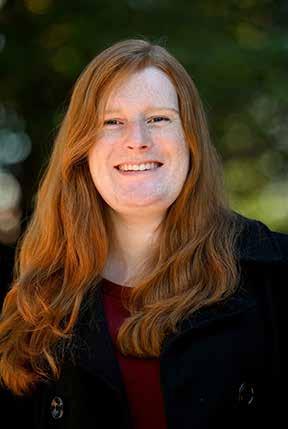
Outside of reading, she enjoys getting out and going on walks, hikes, and roller skating. She tries to get outside every day the weather allows, especially when she feels stuck in her writing. “Being in nature helps me through the drafting process so much.” When she is not trying to push through a draft, you can usually find her at a movie theater watching anything and everything, playing board games or Dungeons and Dragons with friends, or lounging at home with her partner, their cat, Tesla, and their 18-year-old dog, Brutus.
She received an associate of science degree in computer science from Chattanooga State Community College and a bachelor of science degree in software systems with a minor in creative writing from the University of Tennessee at Chattanooga.
Turner will receive her master’s in English, creative writing, from the
32
Emily Turner
University of Tennessee at Chattanooga at the end of spring. Her thesis contains two parts. The first part is a craft paper that explores alternative plot structure techniques used to convey transgender narratives within Jennifer Boylan’s nonfiction memoir She’s Not There: A Life in Two Genders and Torey Peters’ literary fiction novel Detransition, Baby. The second part is a creative piece that contains five essay chapters from Cracking, a memoir that follows her childhood as she explored her gender identity while suffering through the societal and religious influence of a small, Southern town, and her adulthood when she embraced her gender identity, transitioned, and realized that the town she grew up in may no longer be the safe place she once thought. The graduate school accepted Cracking on February 20, 2024.
She chose her topic because she wanted to see more depictions of Southern transgender identity. In Cracking, she speaks about the struggles often faced by transgender people in the current political climate in the South and provides context to those issues using examples from her life. She has a deep love for the relationships and life she cultivated here, and she has tried to convey that feeling, while also informing readers about the harshness and the danger growing for transgender people who call the South home. Her thesis advisor is the “amazing” Dr. Sarah Einstein.
“Her care and guidance will always be invaluable.”
Turner plans to finish the development of the Integrated Single Event Effects Utility (ISEEU) tool, a computer science project that she passionately developed over the past two-and-a-half years with mentorship from Dr. Daniel Loveless and Dr. Donald Reising from UTC’s Engineering Department. ISEEU is a web application that streamlines the process of requesting and scheduling radiation effects, hardening research time at the NASA, Berkeley, and Texas A&M heavy ion particle accelerators, which aerospace engineers use to test computer systems utilized in space radiation secure hardware. ISEEU received an award for student research at UTC’s 2022 Technology Symposium and secured full funding for continued development, which allowed her to work on the project while completing her master’s degree. While she completes ISEEU over the summer, she intends to pursue further opportunities in the software engineering field and complete a second draft of both her nonfiction memoir, Cracking, and her unnamed science fiction novel that she began during Dr. Sybil Baker’s novel-writing course from last Fall. Her time in the creative writing program has instilled in her a desire to be a lifelong writer, and she plans to continue to write whenever she can for as long as she can.
33
MEACHAM WRITERS’ WORKSHOP HOSTS SPRING EVENTS
Visiting writers and alumni readers filled a robust spring edition of Meacham Writers’ Workshop held March 20–23. A Creative Writing Club event on Wednesday kicked off the events with Christina Catherine Martinez (Meacham Fellow) discussing her life of comedy, art, and writing. Martinez, for a decade, worked as a successful art critic, but decided to follow her dream of becoming a writer. She felt guilty about the switch, thinking that she was fortunate in her career, but moved on first into comedy and then into
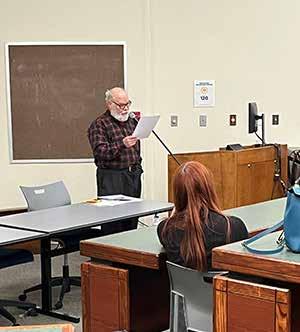

34
Ray Zimmerman
Earl Braggs
writing. Students had many questions about her life and she fielded them with poise and humor.
Thursday saw readings by UTC alumni at ArtsBuild, including Cynthia Young, Alice Smith, L.S. McKee, and Emilia Phillips. The event was co-sponsored by Alumni Affairs. Friday was busy with a noon reading at UTC and an evening reading at Stove Works. At the noon reading, students and faculty enjoyed works by poet Ray Zimmerman, nonfictionist Karen Babine, Thomas Balazs (who read some nonfiction versus his usual fiction), and fictionist Russell Helms. The Friday evening reception and reading featured Christina Catherine Martinez, with other readings by Paul Luikart, K.B. Ballentine, Trenna Sharpe, and Earl Braggs.
Saturday shifted to the event’s signature workshop, this year with Emilia Phillips. Also, students received oneon-one conferences with visiting writers. Dr. Sybil Baker led and organized the threeday event with assistance from student Marion Burgess. Meacham ended with a reading from students published in the most recent Sequoya Review.


35
Christina Catherine Martinez
Paul Luikart
KENNEDY LECTURE EXAMINES DUE PROCESS IN HAMLET
On March 28, the English Department hosted Harvard University’s Dr. Jeffrey Wilson for the annual Kennedy lecture organized by Dr. Bryan Hampton. Wilson’s lecture was entitled “Justice for Hamlet” and canvassed the tension between revenge tragedy and the drama of due process. In Hampton’s words: “Arguably the most famous interpretive problem in all of Shakespeare’s works, Hamlet’s delay has troubled audiences and academics for centuries. Psychological explanations abound for why Hamlet can’t kill Claudius (who killed Hamlet’s father), though these readings rarely recognize that the problem of Hamlet’s delay raises key questions about what justice is and how best to achieve it. Surprisingly, no one has ever explained how questions of crime and justice in Hamlet relate to the nascent system of criminal justice in Elizabethan England. This talk contends that Hamlet’s delay is a dramatization of due process in criminal justice proceedings—making Hamlet less of a ‘revenge tragedy’ and more of a ‘tragedy of criminal justice.’”
 Dr. Jeffrey Wilson
Dr. Jeffrey Wilson
36
NEWS-aegis
TAKE 5 TAKES ON EDUCATION
The theme for spring 2024’s reading/lecture series Take 5, led by Dr. Aaron Shaheen, was “Higher” Education. Shaheen notes that the scare quotes are all too intentional. Higher education, in its traditional sense, has been in the news, as colleges and universities have come under fire for missteps, whether real or imagined. Amid skyrocketing tuition costs and controversies surrounding diversity initiatives, campus speaker cancellations, and accusations of political indoctrination, higher education—both as a concrete post-high school experience and as an abstract concept—is ripe for reflection and reconsideration. Here is a look at the lineup:
January 23: Dr. Aaron Shaheen presented Robert Penn Warren’s All the King’s Men
February 13: Dr. Verbie Prevost presented Dai Sijie’s Balzac and the Little Chinese Seamstress
February 27: Dr. David Pleins presented Emma Smith’s Portable Magic: A History of Books and Their Readers
March 19: Dr. Victoria Bryan presented R.F. Kuang’s Babel, or the Necessity of Violence
April 9: Dr. Bryan Hampton presented Julie Schumacher’s Dear Committee Members
The five books asked what it means to be educated at a higher level, whether in a formal academic setting or in other venues far from quads and ivy-covered buildings.
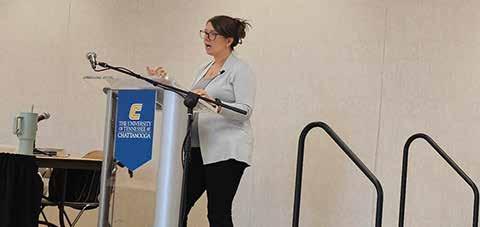
37
Dr. Victoria Bryan leading a Take 5 session
JOIN US ON UTC ENGLISH DEPARTMENT SOCIAL MEDIA
The English Department is being well represented in social media spaces thanks to Andrew Najberg who manages accounts with Facebook, Twitter, and Instagram. Make sure you take advantage of this publicity outlet by emailing your events and achievements to Andrew at AndrewNajberg@utc.edu.
In Andrew’s own words here is what he needs:

“We are looking for anything that lets the department, the University, and our alumni community know what you’ve been up to. Send us announcements about publications, interviews, and events. Send us information about your courses, current and future. If it involves your relationship to English or the University community, it is fair game. As you do send material, there are ways to help out: send your photo, an image you find relevant to your announcement, the cover of the publication, or a URL. If you have exact text you’d like included let me know, but it should be minimal. If you have instructions about when to post, let me know that as well. If you’re sending a class announcement, send the covers of the books you’re teaching or a pertinent image.”
CONTACT
ANDREW HERE


38
AWARDS BANQUET FILLS THE GUERRY
CENTER
The annual English Department awards banquet played to a full house in the Guerry Center reading room. Both graduate and undergraduate students received awards and scholarships, and the department head’s’ faculty awards ended the celebration. The event was hosted by Dr. Andrew McCarthy who eloquently (and with humor) noted that with an English degree,

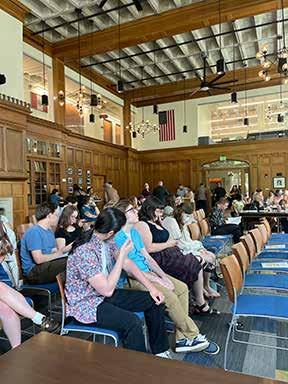
graduating seniors have a world of opportunities from which to choose.
Seniors earning departmental honors in English were: Daley Culberson, Julia Kicinski, Brooke Pierson, and Emily Turner.
Graduating seniors, both graduate and undergraduate, were recognized.
39
DEPARTMENT HEAD’S ANNUAL FACULTY AWARDS
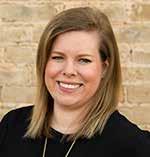
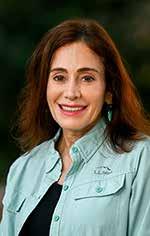

Outstanding Tenure Track Award
Dr. Megan Hartline
Outstanding Lecturer Award
Professor Tracye Poole
Outstanding Adjunct Award
Professor Margaret Green
40
SEQUOYAH REVIEW LAUNCHES NEW ISSUE

Sequoyah Review, the literary journal published by the Department of English, launched its latest issue under the guidance of Dr. Karen Babine. Highlighting the event, students published in the journal participated in the reading of their published works.
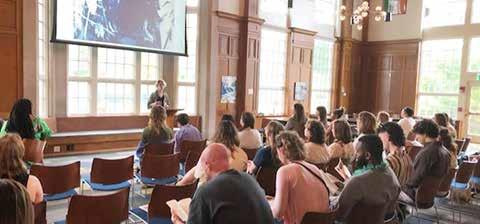
41
Hannah Rittter reading at the event
GRADUATE STUDENT SPOTLIGHT: BROOKE PIERSON
Brooke Pierson is from Destin, Florida. She moved to Tennessee after graduating from American University with a BA in literature. In terms of hobbies, she tends to find one she likes and becomes obsessed with perfecting it, varying from baking to running to teaching herself to play the piano. Reading has always been a consistent hobby, being the one she returns to after the disruptions of life interfere with her other interests.
 Brooke Pierson
Brooke Pierson
She is now pursuing an MA in English with a concentration in literary studies, and will graduate in August. She had planned to graduate this spring, but her father passed away in September of 2022 (her first semester here), so it has been a rough two years, she says. She decided to extend her graduation into the summer in order to give herself the time to write a thesis she would be proud of, instead of scrambling and stressing to get it done “on time.”
Her thesis shows how literature represents mental illness, specifically how stories demonstrate that human emotional suffering is complicated and messy, and can’t necessarily be neatly diagnosed and treated via a medicalized manual/perspective. She looks at two contemporary fiction novels, My Year of Rest and Relaxation by Ottessa Moshfegh and My Dark Vanessa by Kate
42
Elizabeth Russell, and argues that these novels critique the medicalization of mental illness by illustrating experiences of human emotional distress that resist and/or surpass a DSM diagnosis. She decided on this topic because of her experience of grief and her continual inability to understand it. She read both of these books the summer after her father died, and the earnest expression of emotional distress/suffering that she found within both touched her in a way that is very difficult to explain. She says, “It felt like these books were saying all of the things I either felt I couldn’t say, or found the words where I lacked them.” Her thesis advisor is Dr. Christopher Stuart, and she is incredibly grateful for his support, his belief in the importance of her thesis, and his relentless urging to find her voice in this project.
Pierson has always been drawn to books. When she was in elementary school, she read a book series called Warriors, which was about one of her favorite things, cats. “That series really kickstarted my love of reading.” When it came to college, though, there was a period when she felt lost regarding what she wanted to major in. However, during a hiatus from school, she picked up her love of reading again and decided that English felt right in her heart and her head. What exactly she would do with the
degree after graduation, she had no clue. “Luckily, during my time at community college, inspired by the wonderful teachers I had there, I realized that I wanted to teach and share my love of literature and storytelling.”
After graduation, she will serve as an adjunct professor, teaching rhetoric and composition at UTC. She is “eternally grateful to Dr. Jenn Stewart, the Director of Composition and supervisor of the Graduate Teaching Assistants, for her guidance and mentorship over the past two years (and for allowing her office to be a safe space for judgment-free crying, haha).”
While her thesis explores the complexity of mental illness/health, her interests in reading/research vary. “Some days I’m drawn to reading something like the history of horror, some days I want to settle down with a classic, and some days I don’t want to read at all.” She thinks that storytelling is one of the strongest tools we have as a means of connecting with one another (and maybe even connecting something within ourselves), so a common thread underlying all of her reading/research is just a simple interest in expanding her perspective of the world and hearing the stories of others. This ties to another reason why she selected English as her major—the flexibility.
43
GRADUATE STUDENT SPOTLIGHT: JULIA KICINSKI
Julia Kicinski enjoys hiking and spending time outdoors. She recently started quilting as a hobby, so when she has free time, she learns and practices the craft. She also loves dogs (a soft spot in particular for Labs). She lived in rural upstate New York most of her life; she moved to Tennessee for graduate school and loves living in Chattanooga. “Fun fact about me: I’m the exact middle child—number seven—out of thirteen in my family.” She earned a BA in English from Cedarville University in Cedarville, Ohio.
This semester, she is completing her MA in English with a concentration in rhetoric and professional writing. Her scholarly project is titled, “Walking the Line: Complementarian Women Speak.” In it, she analyzes the rhetorical strategies used by women rhetors in conservative church settings to determine how they navigate traditional gender boundaries to avoid crossing over into what they believe to be the male role of preaching. Kicinski’s project advisor is Dr. Heather Palmer. Here is her abstract: “Complementarian women who teach in a conservative church setting use a rhetoric of conformity to maintain their conventional roles. This essay examines Rosaria Butterfield and Nancy DeMoss Wolgemuth’s rhetor-
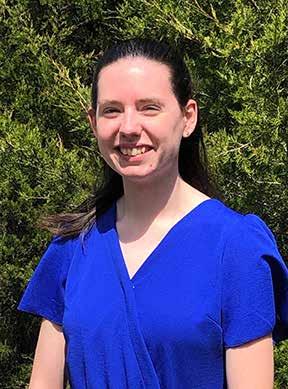 Julia Kicinski
Julia Kicinski
44
ical strategies as they share Biblical knowledge without crossing the boundary into what they recognize as the male role of preaching. This analysis adds to the ongoing conversation of female religious rhetorics occasioned by Bible teacher Beth Moore’s recent separation from the Southern Baptist Convention. Butterfield and Wolgemuth’s conformative rhetoric in conjunction with Moore’s subversive rhetoric reveals how complementarian women can observe the boundaries of their teaching positions by avoiding authoritative claims to Scripture interpretation, relying heavily on personal experience as evidence, and sharing knowledge of the Bible rather than trying to influence a major life change. This study explores how the rhetorical strategies of women seeking to maintain traditional beliefs without attempting to challenge male authority can be just as effective in navigating boundaries as subversive rhetoric of egalitarian women.”
Kicinski became interested in religious rhetorics while taking several of Dr. Palmer’s classes. In her Women’s Rhetorics class in spring 2023, she noticed a pattern in scholarship giving space to women who challenged traditional gender boundaries and started wondering about the difference in rhetorical strategies of women who choose not to challenge those established
boundaries in a conservative church setting. The question intrigued her, so she decided to pursue the topic.
Kicinski loves to study language and words, so English was an obvious choice for her degree. Her undergraduate English degree had more of a focus on literature, and while she enjoys literary analysis, she was also interested in branching out and learning new skills and ideas. When considering her long-term career goals, rhetoric and composition classes seemed not only intriguing as topics of study, but also taught skills that align well with her long-term career goals.
When she reads for fun, she enjoys a variety of genres such as historical fiction, dystopian novels, mystery/adventure novels, and animal stories with happy endings. Some of her favorite novels: The Hidden Hand by E.D.E.N. Southworth, The Scottish Chiefs by Jane Porter, Atlas Shrugged by Ayn Rand, and Bodie Thoene’s historical fiction series.
For the near future, she will be working in the marketing department of a local sign-making company. However, her long-term goal is to pursue a career either in the editing and publishing field or teaching college English. “Because I’m addicted to learning, I may end up back in school in a few years to pursue a Ph.D.”
45









 Dr. Donnie Sackey
Dr. Donnie Sackey




 Jane Dodge
Jane Dodge

















 Gwen Mullins
Gwen Mullins
 Tracye Pool
Tracye Pool

















 Dr. Jeffrey Wilson
Dr. Jeffrey Wilson











 Brooke Pierson
Brooke Pierson
 Julia Kicinski
Julia Kicinski